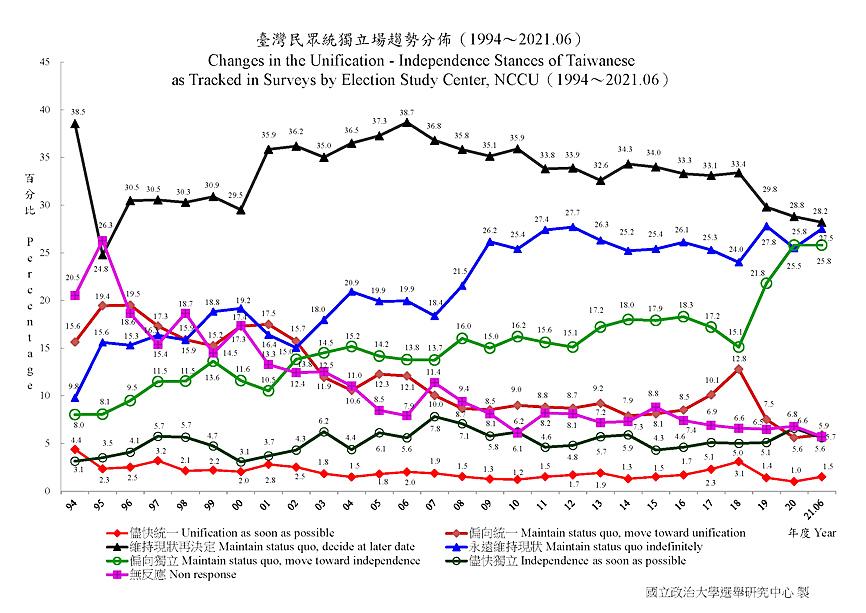Self-identification as “Taiwanese and Chinese,” or solely as “Chinese,” has dropped to record lows, while 63.3 percent of the public regard themselves as Taiwanese, a survey released on Tuesday by National Chengchi University’s Election Study Center showed.
Respondents identifying as Taiwanese and Chinese dropped to 31.4 percent, while those identifying solely as Chinese fell to 2.7 percent, the survey showed.
The results reflect changes in attitudes since 1994 among Taiwanese toward independence and unification with China, as well as self-identification trends since 1992, commenters said.

Screen grab from the Web site of National Chengchi University’s Election Study Center
Support for independence was 25.8 percent, while about 5 percent of respondents said that they want the nation to “declare independence as soon as possible,” the survey showed.
Support for the “status quo” in the Taiwan Strait was 28.2 percent, while 27.5 percent said they would prefer that the “status quo” be permanent, the survey showed.
The results showed that 1.5 percent of respondents want “unification with China as soon as possible,” while 5 percent said that they leaned toward unification.
Democratic Progressive Party (DPP) Legislator Hsu Chih-chieh (許智傑) yesterday said that Chinese oppression of Hong Kong’s democracy and Taipei’s successful efforts to increase interactions with the international community under the name Taiwan contributed to the increase in people who self-identify as Taiwanese.
The Chinese Nationalist Party (KMT) should abandon its outmoded adherence to the so-called “1992 consensus” and dreams of “uniting China,” Hsu said.
The “1992 consensus” — a term that former Mainland Affairs Council chairman Su Chi (蘇起) admitted making up in 2000 — refers to a tacit understanding between the KMT and the Chinese government that both sides acknowledge there is “one China,” with each side having its own interpretation of what “China” means.
The Election Study Center has been conducting polls on the issue of national identification for a long time and its findings should be considered credible, DPP Legislator Chen Ting-fei (陳亭妃) said.
The results show that the oppressive tactics adopted by Beijing — fighter jets circumnavigating Taiwan, oppressing Hong Kong and oppression of Uighurs — not only fail to intimidate Taiwanese, but bolster their belief and self-identification as Taiwanese, Chen said.

The Ministry of Education (MOE) is to launch a new program to encourage international students to stay in Taiwan and explore job opportunities here after graduation, Deputy Minister of Education Yeh Ping-cheng (葉丙成) said on Friday. The government would provide full scholarships for international students to further their studies for two years in Taiwan, so those who want to pursue a master’s degree can consider applying for the program, he said. The fields included are science, technology, engineering, mathematics, semiconductors and finance, Yeh added. The program, called “Intense 2+2,” would also assist international students who completed the two years of further studies in

Former president Tsai Ing-wen (蔡英文) departed for Europe on Friday night, with planned stops in Lithuania and Denmark. Tsai arrived at Taiwan Taoyuan International Airport on Friday night, but did not speak to reporters before departing. Tsai wrote on social media later that the purpose of the trip was to reaffirm the commitment of Taiwanese to working with democratic allies to promote regional security and stability, upholding freedom and democracy, and defending their homeland. She also expressed hope that through joint efforts, Taiwan and Europe would continue to be partners building up economic resilience on the global stage. The former president was to first

Taiwan will now have four additional national holidays after the Legislative Yuan passed an amendment today, which also made Labor Day a national holiday for all sectors. The Chinese Nationalist Party (KMT) and Taiwan People’s Party (TPP) used their majority in the Legislative Yuan to pass the amendment to the Act on Implementing Memorial Days and State Holidays (紀念日及節日實施辦法), which the parties jointly proposed, in its third and final reading today. The legislature passed the bill to amend the act, which is currently enforced administratively, raising it to the legal level. The new legislation recognizes Confucius’ birthday on Sept. 28, the

The Taipei District Court sentenced babysitters Liu Tsai-hsuan (劉彩萱) and Liu Jou-lin (劉若琳) to life and 18 years in prison respectively today for causing the death of a one-year-old boy in December 2023. The Taipei District Prosecutors’ Office said that Liu Tsai-hsuan was entrusted with the care of a one-year-old boy, nicknamed Kai Kai (剴剴), in August 2023 by the Child Welfare League Foundation. From Sept. 1 to Dec. 23 that year, she and her sister Liu Jou-lin allegedly committed acts of abuse against the boy, who was rushed to the hospital with severe injuries on Dec. 24, 2023, but did not